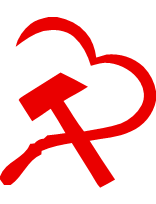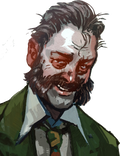Engels, Frederick, socialist, born in Barmen on Nov. 28, 1820, the son of a well-to-do manufacturer. Took up commerce, but already at an early age began propagating radical and socialist ideas in newspaper articles and speeches. After working for some time as a clerk in Bremen and serving for one year as an army volunteer in Berlin in 1842, he went for two years to Manchester, where his father was co-owner of a cotton mill.
In 1844 he worked for the Deutsch-Französische Jahrbücher published by Arnold Ruge and Karl Marx in Paris. In 1844 he returned to Barmen and in 1845 addressed communist meetings organised by Moses Hess and Gustav K?ttgen in Elberfeld. Then, until 1848, he lived alternately in Brussels and Paris; in 1846 he joined, with Marx, the secret Communist League, a predecessor of the International, and represented the Paris communities at the two League congresses in London in 1847. On the League's instructions, he wrote, jointly with Marx, the Communist Manifesto addressed to the "working men of all countries", which was published shortly before the February revolution [1848] (a new edition appeared in Leipzig in 1872).
In 1848 and 1849 E. worked in Cologne for the Neue Rheinische Zeitung edited by Marx, and after its suppression he contributed, in 1850, to the Politisch-oekonomische Revue. He witnessed the uprisings in Elberfeld, the Palatinate and Baden and took part in the Baden-Palatinate campaign as aide-de-camp in Willich's volunteer corps. After the suppression of the Baden uprising E. returned as a refugee to England and re-entered his father's firm in Manchester in 1850.
He retired from business in 1869 and has lived in London since 1870. He assisted his friend Marx in providing support for the international labour movement, which arose in 1864, and in carrying on social-democratic propaganda. E. was Secretary for Italy, Spain and Portugal on the General Council of the International. He advocates Marxian communism in opposition to both "petty bourgeois" Proudhonist and nihilistic Bakuninist anarchism. His main work is The Condition of the Working-Class in England (Leipzig, 1845; new edition, Stuttgart, 1892), which, although one-sided, possesses undeniable scientific value. His Anti-Dühring is a polemic of considerable size (2nd ed. Zurich, 1886). E.'s other published works include Ludwig Feuerbach and the End of Classical German Philosophy (Stuttgart, 1888), The Origin of the Family Socialism: Utopian and Scientific (4th ed., Berlin, 1891). E. also published Vols 2 and 3 of Karl Marx's Capital and the 3rd and 4th editions of Vol. I, and contributed many articles to the Neue Zeit.
Megathreads and spaces to hang out:
- ❤️ Come listen to music and Watch movies with your fellow Hexbears nerd, in Cy.tube
- 💖 Come talk in the New Weekly Queer thread
- 💛 Read and talk about a current topics in the News Megathread
- 💚 Come and talk in the Daily Bloomer Thread
- ⭐️ September Movie Nominations ⭐️
reminders:
- 💚 You nerds can join specific comms to see posts about all sorts of topics
- 💙 Hexbear’s algorithm prioritizes comments over upbears
- 💜 Sorting by new you nerd
- 🌈 If you ever want to make your own megathread, you can reserve a spot here nerd
- 🐶 Join the unofficial Hexbear-adjacent Mastodon instance toots.matapacos.dog
Links To Resources (Aid and Theory):
Aid:
Theory:


DAE feel a profound, mournful, & bittersweet love for humanity when they listen to the soundtrack?
soundtrack?
It makes me remember how I got here. The aching sensation of knowing I’ve fucked up, a lot. The vastness of it invites reflection. The beauty of the sky ties it all together. As I remember it and when I saw the menu first.
No matter how bad a shift, the parking lot always had a breathtaking sunrise. It honestly looked a lot like revachols during certain parts of the year. Very orange and pink over a blue that pales over time. I only stopped to appreciate it after realizing that.
I don’t think I would have started fighting back against addiction without that game. One of the few I’d actually call art.
Thanks for the chance to remember by typing this.
:') that's very beautiful, comrade. and no problem, my pleasure
The karaoke success was a beautiful song too. Which one is your favorite?
Karaoke success is pretty good...but karaoke fail tho???? 👀
Jokes aside, both of the "walking around Revachol" themes are great, but the nighttime version never fails to get me weepy and might be my all around favorite. I also really love the music that plays when you talk to Joyce, the Phasmid discovery music, and "Tiger King" (I think it's the track that plays when Harry is dreaming). The boat ride song is really nice, too.
No matter what happens in court, the talent can still collaborate with the band. We might get more of the same vibes even if it isn’t exactly the same.
Can't tell you how many cold coastal mornings I get up, bundle up, step outside for another day of labor, and whistle Instrument of Surrender.
Can't stop passing the Shivers checks.
TFW ur brain is inexorably linked to the genuinely supranatural
Genuinely though that sounds like such a vibe. It's music that can make u feel genuinely connected to your physical surroundings in a really unique way.